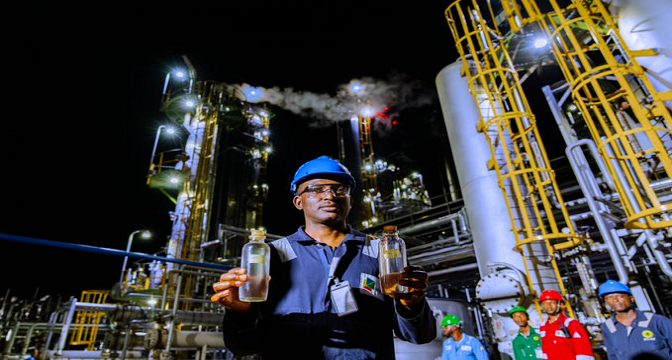The Secretary of the Alesa community stakeholders, Timothy Mgbere, has claimed that the petroleum products reportedly loaded from the recently rehabilitated Port Harcourt Refinery were not freshly refined but rather leftover stock stored for over three years.
Mgbere further alleged that only six trucks were loaded on Tuesday, despite official statements suggesting that 200 trucks would be dispatched daily.
Concerns Raised Over Refinery Operations
Speaking during a live television interview, Mgbere questioned the true status of the Port Harcourt Refinery, located in Alesa, a key community in Eleme, Rivers State. The refinery resumed operations this week after years of dormancy, sparking both optimism and skepticism among stakeholders.
According to Mgbere, the grand reopening ceremony was more of a “show” than an actual milestone. He pointed out that only select units of the old refinery complex are functional, contradicting claims by the Nigerian National Petroleum Company Limited (NNPCL) that the facility is operating at 70% capacity.
NNPCL’s Production Claims
The NNPCL announced that the rehabilitated refinery is producing significant outputs, including:
- Diesel: 1.5 million liters daily.
- Pour Fuel Oil: 2.1 million liters daily.
- Straight-Run Gasoline (Naphtha) blended into 1.4 million liters of petrol daily.
- Kerosene: 900,000 liters daily.
The company also stated that approximately 200 trucks of petrol would be released into the Nigerian market each day.
Alesa Community Challenges NNPCL Narrative
Mgbere countered these claims, emphasizing that the refinery’s reported activities do not align with ground realities. “What we are seeing in the media is different from what is happening on-site,” he remarked. He further alleged that the refinery’s operations are being misrepresented to create an illusion of full functionality.
Highlighting the minimal dispatch of just six trucks from the refinery, he stated, “The product loaded was not newly refined; it was old stock stored for over three years. This cannot be considered a true reflection of the refinery’s capacity.”
Call for Transparency
Mgbere called on the NNPCL to provide accurate information about the refinery’s progress and avoid misleading Nigerians. He expressed hope that the facility would eventually achieve its full potential but stressed the need for honesty about current capabilities.
The Port Harcourt Refinery, a significant economic hub for the Alesa community, remains a symbol of both promise and contention as stakeholders await substantial evidence of its restoration.



